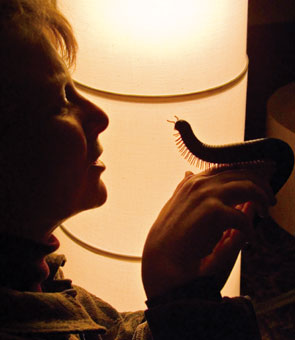
Janine Benyus' luscious 1997 book Biomimicry: Innovation Inspired by Nature is unique and profound. In the book, she not only invents a new field that she has named biomimicry, but she inverts the way we all think about design — the alchemy that turns intention into action.
Benyus draws her design inspiration from nature's wisdom, not people's cleverness. Some 3.8 billion years of evolution have exposed the design flaws of roughly 99% of nature's creations — all recalled by the Manufacturer. The 1% that have survived can teach powerful lessons about how things should be built if they're to last. For example, nature's design genius has led to the creation of bat-inspired ultrasonic canes for the blind, synthetic sheets that collect water from mist and fog as desert beetles do, and paint that self-cleans like a lotus leaf. Little plastic-film patches have been designed using adhesiveless gecko-foot technology, so that carpet tiles can be stored in a big roll, but also easily removed. Equally promising, we'll soon make solar cells like leaves, supertough ceramics that resemble the inner shells of abalone, and underwater glue that mimics the natural as forests.
Biomimicry isn't biotechnology. Biomimicry learns and emulates how spiders make silk; biotechnology transplants spiders' silk-making genes into goats, then sorts silk from milk and hopes the genes don't get loose. Biotechnology is smart kids in an oil depot with matches; biomimicry is wise adults in a rain forest with flashlights. Biotechnology is pure hubris; biomimicry is luminous humility — treating nature as model and mentor, cherished not as a mine to be stripped of its resources but as a teacher.
Steering this design revolution is a centered, gentle, funny, lovely lady who lives in North America's Montana Rockies, observes deeply, writes with rare beauty, and lectures breathtakingly. By reorganizing the biological literature around function not organism — to reveal which organism knows how to solve your design problem — Benyus and her colleagues at the Biomimicry Guild and Biomimicry Institute in Montana are starting to help the world of the made work like, and live harmoniously with, the world of the born.
This will change your life. It has already changed mine. And it may save the world.
Amory B. Lovins is chairman and chief scientist of Rocky Mountain Institute